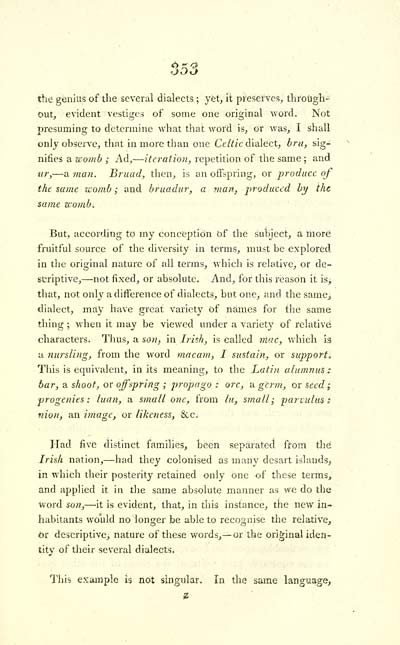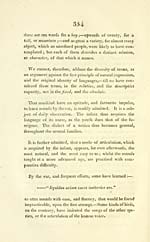Blair Collection > Celtic researches, on the origin, traditions & language, of the ancient Britons
(447)
Download files
Complete book:
Individual page:
Thumbnail gallery: Grid view | List view

the genius of the several dialects ; yet, it preserves, through-
out, evident vestiges of some one original word. Not
presuming to determine what that word is, or was, I shall
only observe, that in more than one Celtic dialect, bru, sig-
nifies a womb ; Ad, — iteration, repetition of the same ; and
«r, — a ma7i. Bruad, then, is an offspring, or produce of
the same womb ,• and bruadur, a man, produced by the
same womb.
But, according to my conception of the subject, a more
fruitful source of the diversity in terms, must be explored
in the original nature of all terms, which is relative, or de-
scriptive, — not fixed, or absolute. And, for this reason it is,
that, not only a difference of dialects, but one, and the same,
dialect, may have great variety of names for the same
thing ; when it may be viewed under a variety of relative
characters. Thus, a son, in Irish, is called mac, which is
a 7iursling, from the word macam, I sustain, or support.
This is equivalent, in its meaning, to the Latin alumnus:
bar, a shoot, or offspring ; propogo : ore, a germ, or seed ;
progenies: htan, a small one, from In, small; parvulus :
nion, an image, or likeness, &c.
Had five distinct families, been separated from the
Irish nation, — had they colonised as many desart islands,
in which tlieir posterity retained only one of these terms,
and applied it in the same absolute manner as we do the
word son, — it is evident, that, in this instance, the new in-
habitants would no longer be able to recognise the relative,
or descriptive, nature of these words,— or the original iden-
tity of their several dialects.
This example is not singular. In the same language,
out, evident vestiges of some one original word. Not
presuming to determine what that word is, or was, I shall
only observe, that in more than one Celtic dialect, bru, sig-
nifies a womb ; Ad, — iteration, repetition of the same ; and
«r, — a ma7i. Bruad, then, is an offspring, or produce of
the same womb ,• and bruadur, a man, produced by the
same womb.
But, according to my conception of the subject, a more
fruitful source of the diversity in terms, must be explored
in the original nature of all terms, which is relative, or de-
scriptive, — not fixed, or absolute. And, for this reason it is,
that, not only a difference of dialects, but one, and the same,
dialect, may have great variety of names for the same
thing ; when it may be viewed under a variety of relative
characters. Thus, a son, in Irish, is called mac, which is
a 7iursling, from the word macam, I sustain, or support.
This is equivalent, in its meaning, to the Latin alumnus:
bar, a shoot, or offspring ; propogo : ore, a germ, or seed ;
progenies: htan, a small one, from In, small; parvulus :
nion, an image, or likeness, &c.
Had five distinct families, been separated from the
Irish nation, — had they colonised as many desart islands,
in which tlieir posterity retained only one of these terms,
and applied it in the same absolute manner as we do the
word son, — it is evident, that, in this instance, the new in-
habitants would no longer be able to recognise the relative,
or descriptive, nature of these words,— or the original iden-
tity of their several dialects.
This example is not singular. In the same language,
Set display mode to: Large image | Transcription
Images and transcriptions on this page, including medium image downloads, may be used under the Creative Commons Attribution 4.0 International Licence unless otherwise stated. ![]()
| Early Gaelic Book Collections > Blair Collection > Celtic researches, on the origin, traditions & language, of the ancient Britons > (447) |
|---|
| Permanent URL | https://digital.nls.uk/75768812 |
|---|
| Description | A selection of books from a collection of more than 500 titles, mostly on religious and literary topics. Also includes some material dealing with other Celtic languages and societies. Collection created towards the end of the 19th century by Lady Evelyn Stewart Murray. |
|---|
| Description | Selected items from five 'Special and Named Printed Collections'. Includes books in Gaelic and other Celtic languages, works about the Gaels, their languages, literature, culture and history. |
|---|

